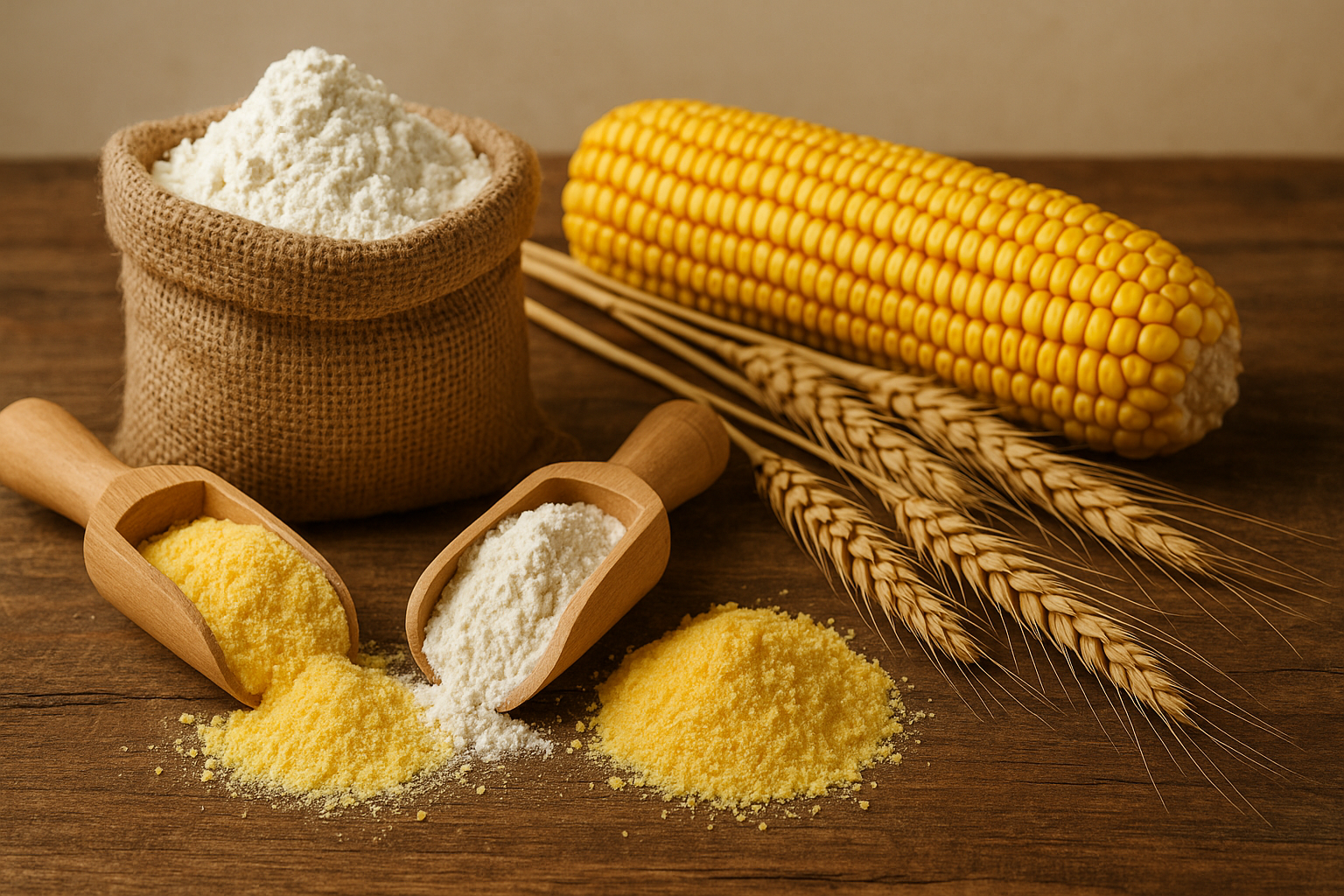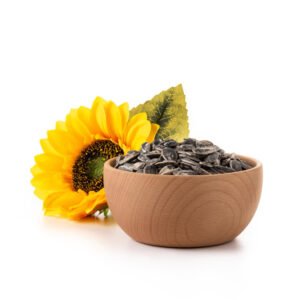The baking world has witnessed a growing shift toward alternative flours, with home bakers and professional chefs exploring options beyond traditional wheat flour. The comparison between maize corn flour vs wheat flour has become a hot topic among health-conscious bakers and those seeking gluten-free alternatives. This comprehensive guide examines both flours to help you make informed decisions for your baking projects.
Understanding Maize Corn Flour and Wheat Flour
Maize corn flour comes from finely ground dried corn kernels, creating a naturally gluten-free flour with a slightly sweet flavor and distinctive golden color. Wheat flour, milled from wheat grains, remains the most common baking flour worldwide due to its gluten content and versatility.
The key difference lies in their protein composition. While wheat flour contains gluten proteins that provide structure and elasticity to baked goods, corn flour lacks these proteins, creating different baking characteristics.
Nutritional Comparison: Maize Corn Flour vs Wheat Flour
Macronutrient Profile
When comparing the nutritional values per 100 grams:
Corn Flour:
- Calories: 366
- Protein: 7.3g
- Carbohydrates: 75.6g
- Fat: 4.9g
- Fiber: 7.3g
Wheat Flour (All-Purpose):
- Calories: 364
- Protein: 10.3g
- Carbohydrates: 76.3g
- Fat: 1.0g
- Fiber: 2.7g
The caloric content remains similar, but wheat flour provides more protein while corn flour offers higher fiber content and healthy fats.
Vitamin and Mineral Content
Corn flour excels in several micronutrients:
- Higher vitamin A content (especially yellow corn flour)
- Rich in potassium, magnesium, and phosphorus
- Contains antioxidants like lutein and zeaxanthin
- Good source of B-vitamins, particularly thiamine
Wheat flour provides:
- Higher iron content
- More folate and niacin
- Better selenium levels
- Enriched varieties contain added vitamins
Baking Properties: How Each Flour Performs
Texture and Structure
The most significant difference in the maize corn flour vs wheat flour debate centers on texture. Wheat flour’s gluten content creates elasticity and structure, allowing for:
- Light, airy bread loaves
- Chewy cookies and pizza dough
- Tender, fluffy cakes
- Strong pastry structures
Corn flour produces:
- Denser, more crumbly textures
- Slightly gritty mouthfeel
- Limited rise without additional leavening
- Naturally golden color in baked goods
Moisture Retention
Corn flour absorbs less liquid than wheat flour, requiring recipe adjustments. Bakers often need to:
- Reduce liquid ingredients by 10-15%
- Add binding agents like xanthan gum
- Combine with other flours for better structure
Flavor Profile
Corn flour adds a subtle sweetness and earthy corn flavor that complements:
- Cornbread and muffins
- Mexican and Latin American dishes
- Gluten-free baking applications
- Coating for fried foods
Wheat flour provides a neutral base that doesn’t compete with other flavors.
Discover if cane jaggery is healthier than sugar by comparing their nutrition, benefits, and impact on your health.
Best Uses for Each Flour Type
When to Choose Maize Corn Flour
Corn flour works excellently for:
- Gluten-free baking requirements
- Traditional cornbread and polenta
- Coating for fried chicken and fish
- Thickening soups and sauces
- Mexican tortillas and tamales
- Adding texture to muffins and quick breads
When Wheat Flour Remains Superior
Wheat flour excels in:
- Yeast breads requiring strong gluten networks
- Delicate pastries and croissants
- Pizza dough needing stretch and chew
- Layer cakes requiring light textures
- Cookies needing specific textures
Health Considerations in the Flour Debate
Gluten-Free Benefits
For individuals with celiac disease or gluten sensitivity, corn flour provides a safe alternative. The naturally gluten-free nature makes it suitable for:
- Medical dietary requirements
- Digestive comfort for sensitive individuals
- Expanding menu options for inclusive baking
Glycemic Index Comparison
Both flours have similar glycemic indexes, but corn flour’s higher fiber content may provide:
- Better blood sugar management
- Increased satiety
- Improved digestive health
Nutritional Density
Corn flour’s higher antioxidant content offers potential health benefits:
- Eye health support from lutein and zeaxanthin
- Anti-inflammatory properties
- Enhanced vitamin A intake
Professional Tips for Successful Baking
Working with Corn Flour
- Blend with other flours (rice, almond, or tapioca) for better structure
- Add binding agents like xanthan gum or psyllium husk
- Increase fat content to improve moisture and texture
- Use smaller batch sizes to prevent dense results
Combining Both Flours
Many bakers successfully blend corn and wheat flours to achieve:
- Enhanced flavor complexity
- Improved nutritional profiles
- Unique textures
- Partial gluten reduction
A common ratio starts with 25% corn flour to 75% wheat flour, adjusting based on desired outcomes.
How CMS Industries Supports Your Flour Choices
CMS Industries stands as a trusted manufacturer, supplier, and exporter of premium agricultural products in India, including high-quality maize corn flour. Their commitment to providing pure, premium maize products helps bakers access consistent, reliable ingredients for their baking projects.
The company’s focus on diverse agricultural products, from grains to oil seeds, positions them as a comprehensive source for baking professionals and enthusiasts seeking quality ingredients. CMS Industries understands the growing demand for alternative flours and ensures their maize products meet the standards required for successful gluten-free and traditional baking applications.
Cost and Availability Factors
Price Considerations
Generally, wheat flour remains more economical due to:
- Widespread cultivation
- Established supply chains
- High demand and production volumes
Corn flour typically costs 20-40% more but offers:
- Specialized dietary benefits
- Unique flavor contributions
- Growing market availability
Storage and Shelf Life
Both flours require proper storage, but corn flour’s higher fat content means:
- Shorter shelf life (6-8 months vs 12 months for wheat flour)
- Greater susceptibility to rancidity
- Need for cool, dry storage conditions
Making the Right Choice for Your Baking
The question “is maize corn flour better than wheat flour for baking” doesn’t have a universal answer. Your choice depends on:
- Dietary requirements (gluten-free needs)
- Flavor preferences (neutral vs. corn taste)
- Texture goals (light vs. dense)
- Health priorities (fiber vs. protein)
- Recipe compatibility (traditional vs. alternative)
For versatility and traditional baking applications, wheat flour remains superior. For gluten-free requirements, enhanced nutrition, and distinctive flavors, corn flour offers clear advantages.
Conclusion
The maize corn flour vs wheat flour comparison reveals that both flours serve distinct purposes in modern baking. Wheat flour continues to dominate traditional baking for its gluten content and versatility, while corn flour carves its niche in gluten-free baking, nutritional enhancement, and flavor diversity.
Successful bakers often keep both flours in their pantries, choosing based on specific recipe requirements and desired outcomes. Understanding each flour’s strengths and limitations empowers you to make informed decisions that align with your baking goals and dietary needs.
Ready to explore premium quality maize corn flour for your baking adventures? Connect with CMS Industries to discover their range of agricultural products and find the perfect ingredients for your next culinary creation.
Frequently Asked Questions
Can I substitute corn flour for wheat flour in any recipe?
Direct substitution requires adjustments since corn flour lacks gluten. Replace up to 25% of wheat flour with corn flour in most recipes, or use binding agents for complete substitution in gluten-free baking.
Which flour is better for weight management?
Both flours have similar calories, but corn flour’s higher fiber content may promote satiety. The choice depends more on portion control and overall diet balance than the flour type alone.
Does corn flour affect the taste of baked goods significantly?
Corn flour adds a subtle sweet, earthy flavor that’s noticeable but not overpowering. The taste becomes more prominent in recipes using larger quantities or when used as the primary flour.
How long does corn flour stay fresh compared to wheat flour?
Corn flour typically lasts 6-8 months when stored properly, while wheat flour can last up to 12 months. Store both in cool, dry places in airtight containers.
Is corn flour safe for people with wheat allergies?
Yes, pure corn flour is naturally wheat-free and safe for wheat allergies. Always check labels for cross-contamination warnings if you have severe allergies or celiac disease.





